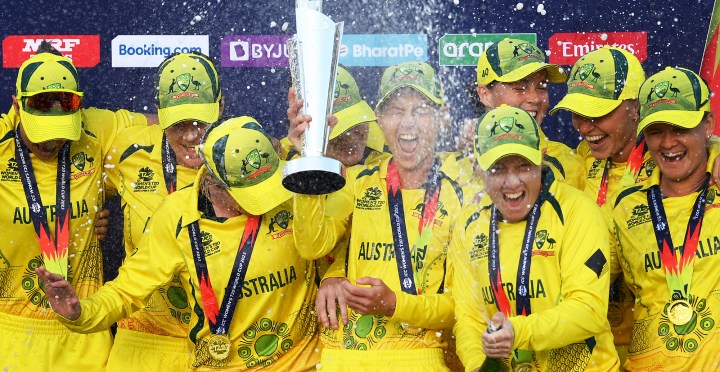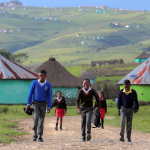INVESTMENT STUMP
No bucks, no glory: SA women’s cricket desperately needs funding to bridge the gap

Australia, England and India finished in the top four of the World Cup with South Africa, but have more structures and systems in place to promote and grow women’s cricket. By contrast, South Africa’s Proteas Women had to punch above their weight to reach cricket’s apex.
After South Africa’s heartbreaking 19-run defeat in the Women’s T20 World Cup final last Sunday, Proteas captain Suné Luus spoke to the media and asked for more help from the powers that be to improve women’s cricket in the country.
“We’ve done our best to give the girls in our country the best possible chance. Obviously, we would have liked to win, but I don’t think we could have given it a bigger shot and more of a chance,” said the skipper.
“It’s up to CSA [Cricket South Africa] and the Minister of Sport and whoever is in charge of cricket in the country to knock on doors and open those doors as well, and give women’s cricket the best chance we possibly have to keep up with Australia, England and India.”
These countries finished in the top four of the World Cup with South Africa, but have more structures and systems in place to promote and grow women’s cricket. By contrast, South Africa’s Proteas Women had to punch above their weight to reach cricket’s apex.
Australia has the Women’s Big Bash League, which started in 2015, the premier Women’s T20 domestic league in the world.
England has The Hundred, a 100-ball competition that started in 2021 with both a men’s and women’s version.
India recently initiated the Women’s Premier League, a women’s version of the popular Indian Premier League.
All three tournaments attract the best women players in the world and in the process improve the standard of domestic cricket in their respective countries. South Africa has no such tournament, which further widens the gap between provincial and international cricket in the country.

Andrew Breetzke (Head Of Player Services and Advocacy) during the Saca photo call session at Sahara Park Newlands on 11 August 2015 in Cape Town, South Africa. (Photo: Ashley Vlotman / Gallo Images)
Investment needed
South Africa’s failure to initiate a tournament of this nature boils down to a lack of financial investment from corporate sponsors in the country.
“A lot gets said about how wonderful it is that our women have done so well, by businesses and by the government, and how important this is for women’s sport generally, not just cricket,” said Andrew Breetzke, CEO of the South African Cricketers’ Association (Saca).
“But, when push comes to shove, we don’t see the investment in the game by the government or by corporations. That’s disappointing. We need investment in the game.
“The investment must not only be at Protea level; it must be at the level below because the pipeline has to be strong for us to be strong at Protea level.”
CSA, almost entirely on its own, ensures that the pipeline from junior cricket to senior women’s cricket exists. It also develops the women’s game and ensures South Africa has “an international team that competes at the highest level”, according to Breetzke.
“With no commercial revenue coming in, really, CSA have to be commended on what they’ve done for the women’s game. They’ve made it the most professional women’s sport in the country by far.”
Momentum, the title sponsor of the Proteas Women, is the only corporate sponsor of the team and has been the only significant one since 2013.
“We need commercial investment in the women’s game. There’s next to none,” said Breetzke.
“Momentum is the only sponsor in the women’s game. So, women’s cricket is effectively being subsidised and we need to get to a point where, financially, it has sponsors behind it.
“Cricket South Africa has financial pressures on it. The entire development of the women’s game is currently sitting with CSA. No one else is helping.
“Hopefully that will happen after the World Cup. The biggest plus for the women at this World Cup is that people have seen how powerful women’s cricket can be for the nation, and hopefully that will bring sponsors to come forward and invest in the women’s game and that will help us get to the point where [earnings for men and women] are the same.”

Suné Luus (captain) of South Africa during the Women’s Tri-Series second T20I match between South Africa and West Indies at Buffalo Park in East London on 21 January. (Photo: Gallo Images)
Visit Daily Maverick’s home page for more news, analysis and investigations
Fair play
There are 55 contracted women’s cricketers in the country. Fifteen Proteas, 10 high-performance (fringe Proteas players) and 30 semi-professional contracts.
The 15 contracted Proteas women receive the same benefits as their male counterparts, such as provident funds, medical aid and cellphone allowances, among others.
The difference is in how much the respective players are paid per match played.
“In T20s, the match fee is about 85% of the men’s. A woman’s T20 match fee is R12,000 and a man’s is R14,000. In ODIs and Tests, it’s about 50% of the men at the moment,” said Breetzke.
“A lot of research has been done on what is equity in cricket. New Zealand is probably leading the way in that match fees in New Zealand between men and women are the same, and that’s what we’re striving for.
“But, when it comes to contract fees [in New Zealand], it’s less because they play significantly less cricket and the broadcast and commercial rights relative to the game are significantly less, so there the equality is not measured in the same manner.”
That is an added layer to equal pay the Proteas Women face. They play far fewer matches than the men.
According to International Cricket Council scheduling, South Africa only have nine days of international cricket left in the current season.
“In the next season, 2023/24, the women play 34 days of cricket, which is 15 ODIs, 15 T20s and one Test. That’s not a lot of cricket. That’s probably half of what the men play,” said Breetzke.
But the challenge of bridging the gap between provincial and national cricket will remain without financial help from the government, said Luus. Breetzke agreed: “Government needs to do more at grassroots level to get girls interested in the game of cricket and playing cricket.”
That obligation lies with CSA as well.
The Proteas Women need private companies to help. Because of their success in being the first senior South African side to reach the final in a World Cup, fans flooded into Newlands Cricket Ground and proved that women’s cricket is a viable product.
“Where we need corporates to get involved is at Protea level, because they need a return for their investment and their return is good publicity and marketing around the Proteas Women,” said Breetzke. DM168
This story first appeared in our weekly Daily Maverick 168 newspaper, which is available countrywide for R25.





















Comments - Please login in order to comment.